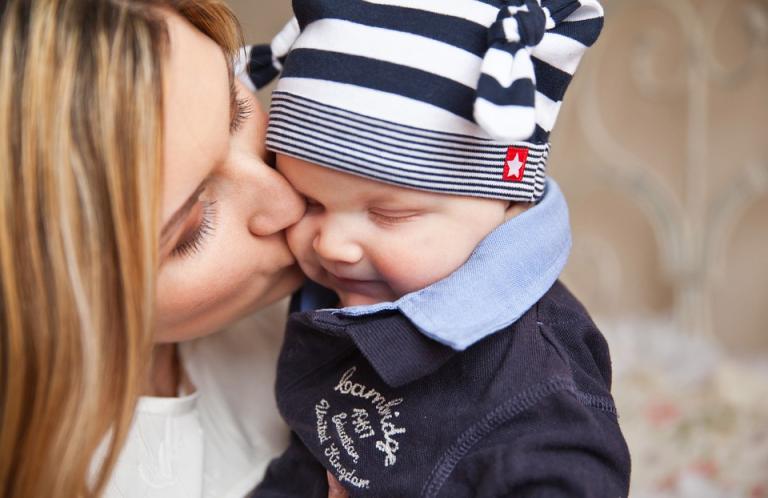 Read a review of Torgeson’s book The Chaplain’s War here.
Read a review of Torgeson’s book The Chaplain’s War here.
At forty, Brad Torgersen describes himself as a “young veteran” among science fiction writers.
“I’ve been around for while,” he says, “but I still have a lot to do.”
Torgersen first tried his hand at writing sci-fi in the early 1990s, writing scripts for a local radio serial called “Searcher&Stallion.” He then moved on to writing short stories and began a slow but steady rise to becoming a publisher author.
After more than 100 rejections, he was named a winner in the 2009 “Writers of the Future” contest, which jump-started his career. Torgersen has been published in leading sci-fi magazines, won a “Reader’s Choice” award from Analog, and has been nominated for a Hugo award three times.
His novel, The Chaplain’s War, was published this fall by Baen Books.
Reporter Bob Smietana recently spoke to Torgersen about his writing and about the lessons of The Chaplain’s War.
Tell me a bit about Harry Barlow, the main character in The Chaplain’s War:
I have a habit of telling stories about ordinary, everyday people who are thrust into extraordinary circumstances and they have to extract themselves from some kind of predicament.
Barlow started out the same way.
The kernel for his story came from a workshop in 2010, on the coast of Oregon. The theme that year was “A Planet too Far”—a place where humanity was hanging on by its fingernails.
At the time, I remembered some research that had been done on Vietnam veterans who were returning from POW camps. The people who had some kind of religious or spiritual foundation had done better in captivity than those without that foundation.
So I thought, what about a POW story? Once I had that framework, I stared to focus on one prisoner in particular.
I thought, well I’ve got an alien war and all these prisoners trapped behind enemy lines—it seemed inevitable somebody would have to serve as a caretaker for these people. So what if you had a chaplain who’d charged his assistant to build a chapel for the prisoners. That’s what this young kid did.
Why make Barlow a chaplain’s assistant and not a full-fledged chaplain?
A chaplain is someone whose been formally trained and been to divinity school, and would have to choose one denomination or religion over the other. I knew my audience wouldn’t be keen on that. With a chaplain’s assistant, I could make him a kind of a neutral party. He would have opinions but wouldn’t necessarily be taking sides.
The other part was, if I made Barlow a believer at the outside of the story, I risked having him be divisive among readers. If he were a staunch Baptist or Jew or a Mormon—then readers would think I was trying to push my beliefs on them through this character.
I didn’t want to make this a push piece. I didn’t want to whack people in the face with religion. I wanted to deal with this big question—what good is faith for? Does it really matter?
I wanted it to be an honest, fictional enquiry into those questions and not a Trojan horse—where I tell the story and then “Aha,” and jump out at the end with the answers.
One of the themes in the books is that small things matter. That’s the case for Barlow—particularly early in the book, when it looks like his efforts have failed. Still he goes to great efforts to keep the chapel in tip-top shape. Why does he bother to do that?
I think people find comfort in the regular patterns of their everyday lives, especially when things around them seem out of control. Those small routines take on a meaning of their own—even though the rest of the universe is crazy and chaotic and going to hell, their own little personal world can have structure and be a refuge.
That’s true for Barlow.
For him, it’s also about doing right by the promise he made to his boss. He may not be an overtly spiritual guy, but he is an honorable guy who wants to keep that promise. And he can see that his service to the chapel is doing a tangible good for these other prisoners.
One of the struggles that Barlow has in the book is the idea of his legacy. He does some pretty amazing things—but is uncomfortable with the idea that he’s some kind of hero. Why is that?
I’ve always admired people who can offer service in a selfless way. I didn’t want Barlow to be a martyr or some kind of savior. In fact for most of the book he’s running from that idea as fast as he can.
I’m just a guy, he says. I’m not special. And he is terrified of anyone thinking he is special.
There’s that constant conflict—does he embrace this larger than life role that people keep trying to assign to him?
What’s the best way to describe his personal journey during the book?
Barlow grows up fast in the book. He comes out of this middle-class American lifestyle from the not-too distant future, where he has been raised to be a decent guy but he doesn’t have a lot of strong beliefs about anything.
He gets wrapped up in the war—because most of his friends get wrapped up in the war. He has to grow because at several points, he’s asked by several people to take on more responsibility.
All of these people recognize that he’s basically a decent guy, who just wants to help.
That’s all they are looking for. They aren’t looking for someone who is going to be a hero. They are looking for a decent guy who is trying to make a difference.
One of the other themes of the book is about the dangers of relying too much on technology. That’s part of the reason the Mantes are so perplexed by the human beings and their faith. It turns out that their technology blinds them to spiritual experiences.
I wanted to tell a bit of a cautionary tale about the role of technology in our lives as well.
The Mantes are this superbly technologically advanced society. They’re cyborgs, and they can’t live with their carriages, a mechanical device that’s integrated with them on a physical level.
But when the Queen Mother is unwillingly stripped of that technology, she is terrified. She is humiliated. It’s the most horrible thing that’s ever happened to her. But gradually over time she discovers there is this whole other level of perception that she didn’t know was there until the technology was taken away.
In our world, we already have people who spend 16, 18, 20 hours a day playing World of Warcraft, and that’s their whole life. They lose themselves in that virtual world. And that’s happening now. What’s it going to be like in 50 or 100 years, when the technology is so much better?
In science fiction, most conflicts with aliens, like in Starship Troopers or Star Trek, end up being resolved by force. But in The Chaplain’s War, the conflict is resolved in a peaceable manner. What can we learn from that?
War can’t go on forever. At some point you have to ask, “Can we coexist with these people?” Unless you exterminate your enemies, sooner or later you have to figure out how you can co-exist.
With The Chaplain’s War, I ended up trying to answer that question from the viewpoint of the aliens.
The Queen Mother has to ask herself, “Is there room in my mind to see humans as equals?” That is a completely radical idea for her and her species. They saw humans as just another form of vermin.
In a lot of science fiction, the protagonists achieve their goals at the tip of a bayonet. But here, the disparity between humans and aliens was too great. So the plot had to hinge on something else.
It really did come down to Barlow. First, he had to sell the Professor and later the Queen Mother on the idea that humans were not their enemy.
He has to say to them, “This war does not have to happen. There’s no reason to continue it. You’ve got us beat.”
And he doesn’t like saying that. It’s humiliating. He has to get past that feeling of humiliation in order to end the war.
At some point, it seems that Barlow also has to embrace his role and the task he’s been given.
Barlow spends a lot of time trying to prove he’s not special. And a couple times, other characters point out that he seems to have been chosen for a reason—that his role is not an accident.
I tried to avoid putting my own beliefs into the story. But in the background, there’s this idea that the Lord calls you, even if you are not ready. And you can either embrace it, or run from it.
But even the lowliest person can be called to do something great.
Image courtesy of The High Calling, used by permission.











